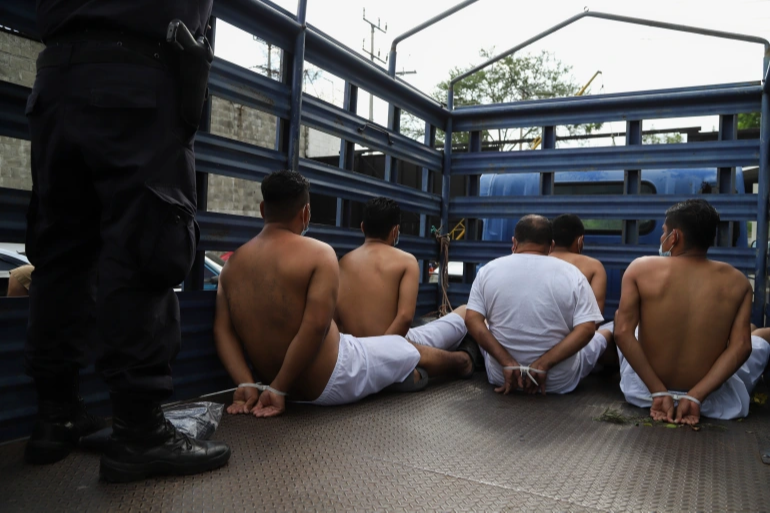
People arrested by police for having alleged links to gangs wait in zip-tie handcuffs in the back of a truck in Soyapango, El Salvador on August 16, 2022 [Salvador Melendez/AP Photo]
San Salvador, August 18 (RHC)-- El Salvador’s Congress has approved a one-month extension to a state of exception used to round up alleged gang members, as the chief of police announced more than 50,000 people had been detained under the extraordinary measures.
The country’s 84-seat unicameral assembly agreed late on Tuesday to grant the government’s newest request to maintain the decree, with 66 members voting in favour of an extension through mid-September.
President Nayib Bukele‘s administration imposed the state of exception in late March after dozens of people were killed in a single weekend of gang-related violence, and Bukele has defended the measure as key to tackling “terrorists.”
“We have strongly impacted the terrorist structures,” Security Minister Gustavo Villatoro said in presenting the extension request to lawmakers. “We have witnessed how Salvadorans were able to enjoy the safest vacations in history”, he added, referring to recent national holidays.
“We can inform the Salvadoran people that we have already reached 50,000 recorded detentions during the period of the emergency regime,” Mauricio Arriaza, director of the National Civil Police, also said.
But rights groups and international observers have accused the government of committing “massive human rights violations” during its gang crackdown. The state of exception suspends certain civil liberties, including the right to association, the right to be informed of the reason for an arrest and access to a lawyer. Many Salvadoran families also say loved ones with no gang ties have been detained in the sweeping arrests campaign, while Amnesty International reported that dozens of people have died in custody.
The Alliance for Peace movement opened an office for legal counselling and said recently it had received 500 complaints for arbitrary arrests.
Meanwhile, El Salvador’s human rights ombudsman, Apolonio Tobar, said his office has 28 open investigations into the deaths of people who perished while in custody under the state of exception.
Outside Congress before the vote, 25-year-old Virginia Guadalupe Solano Lopez said her husband, Jose Alfredo Vega, had been relaxing in their home with their daughter on March 27 in Jiquilisco in eastern El Salvador when police hauled him away without explanation.
She has not seen him since. “He’s not a criminal … he doesn’t have a record, he’s not stained,” she told The Associated Press news agency. “They took him because someone accused him of being with the gangs.”
Armed gangs, which have been estimated to count some 70,000 members in their ranks, have terrorised El Salvador for decades, controlling swathes of territory and extorting and killing with impunity.
Almost 69 percent of the detainees are accused of belonging to the notorious Mara Salvatrucha gang – also known as MS-13 – followed by the Surenos faction of the Barrio 18 gang (17.7 percent) and the Revolucionarios faction of the same group (12.7 percent).
To house some of the detainees, Bukele ordered the construction of a gigantic prison for 40,000 people in a rural area of the city of Tecoluca, in the centre of the country, which should be ready before the end of the year.
However, experts say the government’s focus on arrests and mass incarceration will not solve the problem of gang violence. “Any serious initiative aimed at dismantling gangs and reducing crime needs to address the structural causes of gang membership, including the social marginalization that leads youth into gangs and the lack of rehabilitation programs to offer former gang members employment and education opportunities,” Juan Pappier, senior Americas researcher at Human Rights Watch, wrote in June.
“Moreover, governments should aim at strengthening democratic institutions in El Salvador, including by promoting judicial independence. Independent courts and prosecutors are needed to ensure justice for the victims of gang violence and to take serious steps to dismantle the gangs,” he said.

